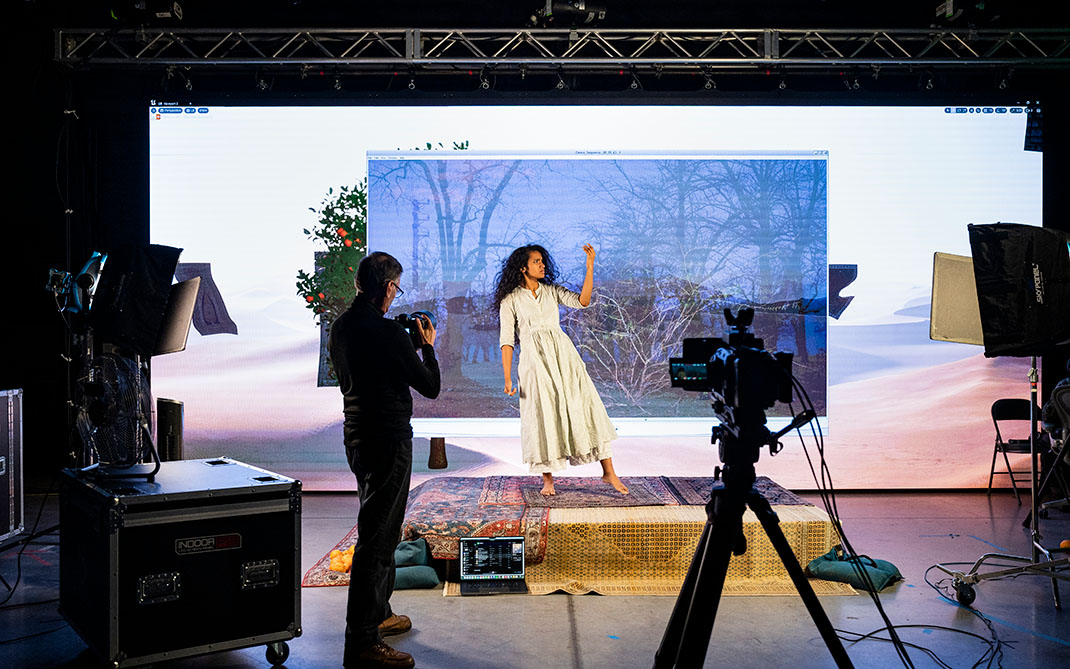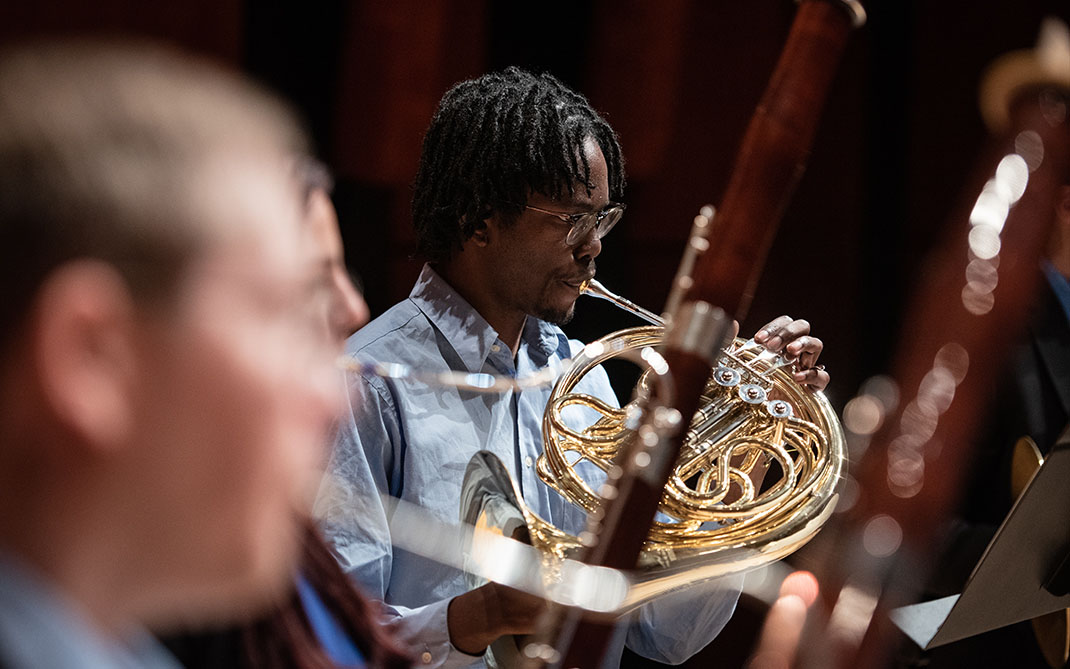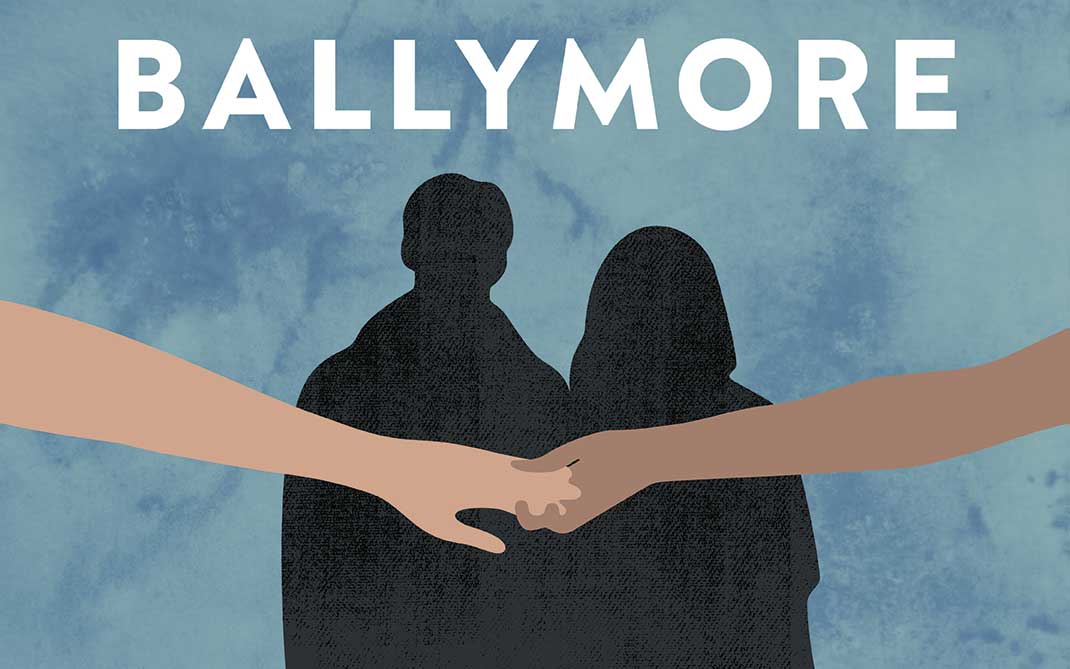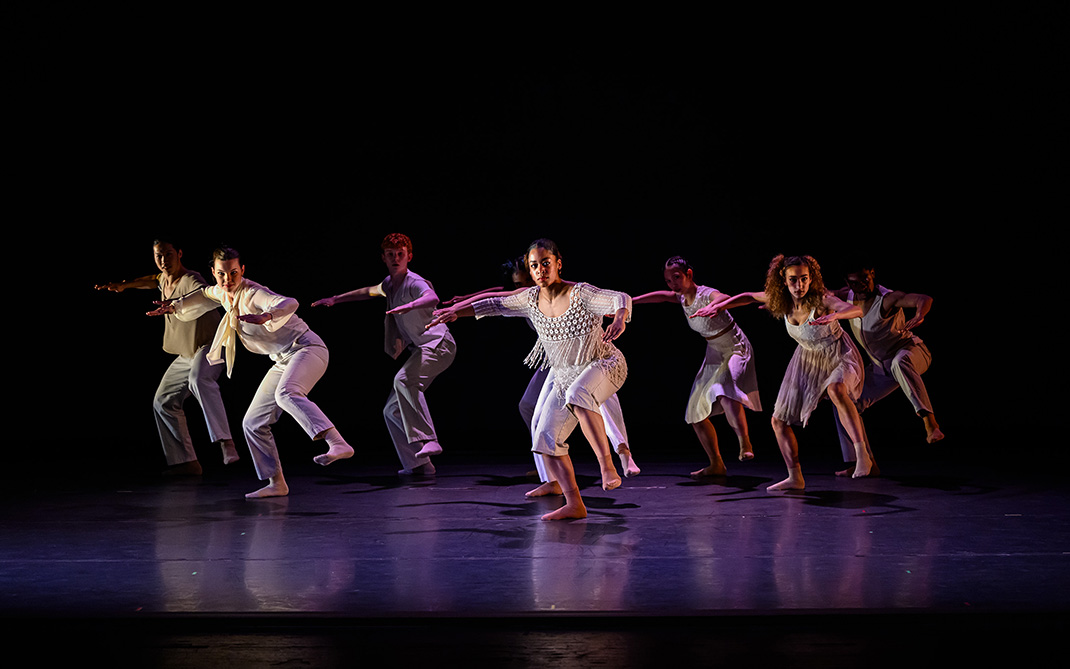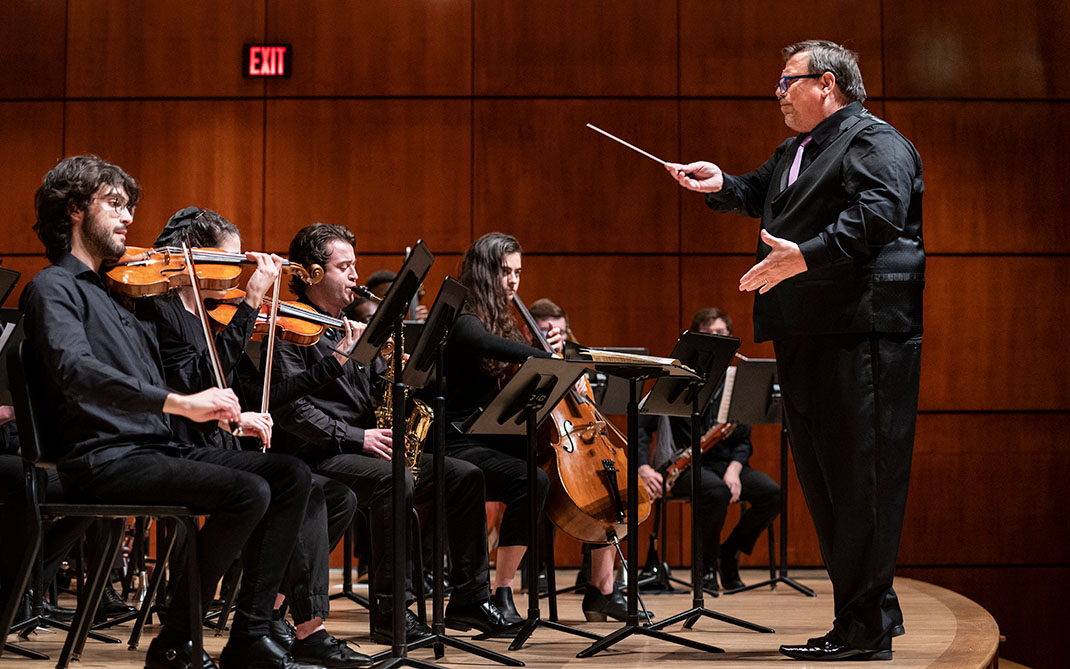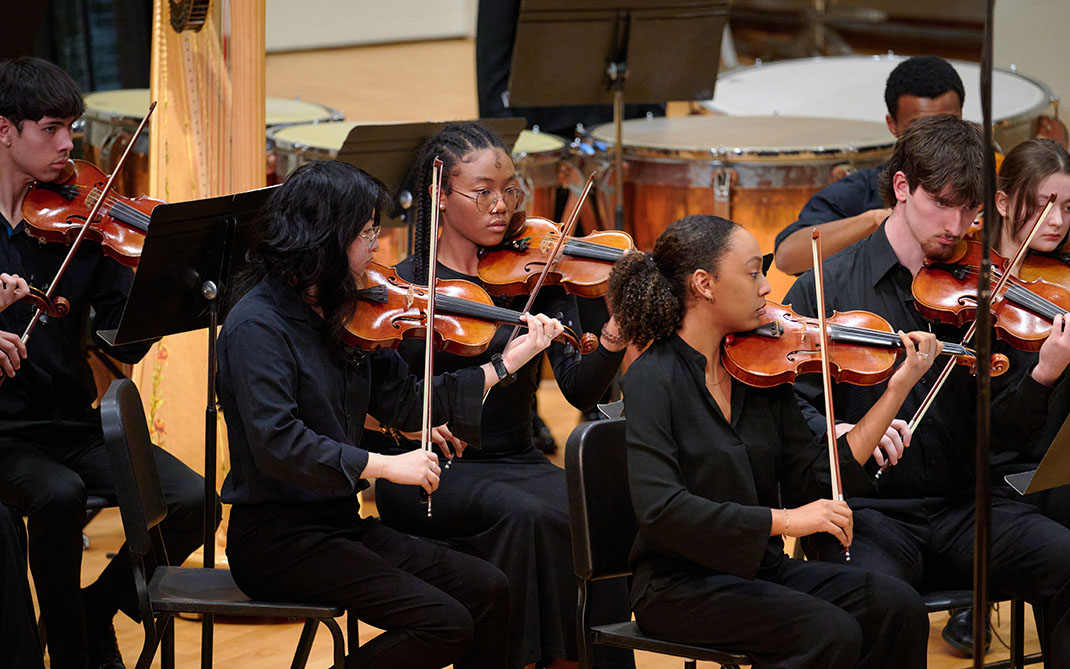Appendix C: UNCSA Student Conduct Process for Alleged Major Infractions of the Student Code of Conduct
Note: The following procedures shall be applicable for Major Charge(s) adjudicated under the Student Code of Conduct. Please note exceptions for case involving Title IX and alleged Sexual Misconduct. Anyone preparing for or involved in the student conduct process for violations of the Title IX Policy should also consult Appendix D and Policy 121.
Definitions
See definitions in Chapter VI.
Investigation
In cases involving Title IX allegations (e.g. allegations of sexual harassment, sexual misconduct, or other sex/gender-based discrimination), the Title IX Coordinator coordinates the investigation. Consult Policy 121.
Allegations may be brought by students, university officials, faculty members, or staff members acting as the Complainant or Reporting Party. The allegation must be in writing and must include factual information supporting the infraction.
- The Director of Student Conduct (or designee) will oversee all investigations, not
including Title IX allegations, and determine whether there is sufficient evidence
to pursue a charge. This determination shall be made within 45 calendar days (or within
a reasonable amount of time) after the initiation of the allegation. Upon making this
determination, the Director for Student Conduct (or designee) will:
- Dismiss the allegation because the facts are insufficient to support a finding of responsible; or pursue a charge. In cases involving Title IX adjudication The Title IX Coordinator will forward their Investigation Report and recommendation to the Director of Student Conduct.
- If pursuing a charge, the Director of Student Conduct (or designee) will:
- Issue a written summons, which includes the specific charge, possible outcomes, and
a brief recitation of the allegations supporting the charge. If expulsion is a possible
outcome, the summons will inform the Respondent that expulsion precludes matriculation
at any UNC constituent institution. The summons will inform the student of the following
options for resolution of the disciplinary charge:
- Accept Responsibility*: Plead responsible to the charge, accept the outcome determined by the Director for Student Conduct (or designee), and provide a signed written acceptance to that effect to the Director for Student Conduct (or designee). In the case of a waiver of Case Resolution Meeting and acceptance of the outcome(s), the Director for Student Conduct (or designee) will forward the student conduct file to the Vice Provost of Student Affairs. The Vice Provost of Student Affairs must determine that this action is voluntary by reviewing the signed acceptance and, if necessary, interviewing the respondent and the Director for Student Conduct (or designee) to determine that the charge and outcome have factual support. The Vice Provost of Student Affairs will send UNCSA’s student conduct decision letter to the student.
- Accept Responsibility but not the Outcome(s): The respondent may choose to go forward with an Outcome-Only Case Resolution Meeting. In this case the respondent accepts responsibility for the charge(s) but not the proposed outcome(s) and shall have an opportunity to recommend alternative outcomes. The Director for Student Conduct (or designee) shall provide the Respondent and Complainant (if applicable), a written notice of time, place, and format of the Case Resolution Meeting. This notice of the Case Resolution Meeting will be sent to the student’s UNCSA email account; other delivery methods may be utilized if appropriate. A student who accepts responsibility and chooses an outcome-only Case Resolution Meeting can appeal the outcomes but cannot appeal their acceptance of responsibility.
- Deny Responsibility: Plead “not responsible” and request a Case Resolution Meeting. The respondent shall have the opportunity to present their evidence and defense through witness testimony and written documents. A respondent may request this form of resolution if they would like your entire case heard from start to finish because they disagree with both the charge(s) and the outcome(s), or because there is a significant question of fact. The Director for Student Conduct (or designee) shall provide the respondent and complainant (if applicable), a written notice of time, place, and format of the Case Resolution Meeting. This notice of the Case Resolution Meeting will be sent to the student’s UNCSA email account; other delivery methods may be utilized if appropriate.
- Issue a written summons, which includes the specific charge, possible outcomes, and
a brief recitation of the allegations supporting the charge. If expulsion is a possible
outcome, the summons will inform the Respondent that expulsion precludes matriculation
at any UNC constituent institution. The summons will inform the student of the following
options for resolution of the disciplinary charge:
*In Major Cases involving Complainants: If the respondent accepts responsibility for violation(s) including Title IX charges of Sexual Misconduct, the Director of Student Conduct will request a meeting with the complainant to discuss the proposed resolution and to determine whether the complainant accepts resolution. The Director of Student Conduct (or designee) will provide the Complainant with a summary outlining the proposed determinations on responsibility and sanction(s) and the rationale related only to those Sexual Misconduct violation(s). The complainant has three Days to respond to an offer of a resolution.
- A complainant who accepts a resolution must voluntarily accept the determinations on responsibility and outcomes(s) accepted by the respondent and waives his/her right to a Case Resolution Meeting. The resolution must be in writing and signed by the complainant and the Director of Student Conduct. The signed resolution may not be appealed.
- If both the respondent and the complainant accept the resolution, the case is resolved with a waiver of a Major Case Resolution Meeting and no further right of appeal.
- In Title IX cases, the respondent and complainant will receive concurrent notification in writing summarizing findings of fact and the conclusion that the respondent violated the Title IX Policy. The written resolution must contain determinations on responsibility and outcomes(s) (if applicable), and the rationales upon which the determinations are based.
- If the Director of Student Conduct (or designee) does not offer a resolution or either the respondent or complainant does not accept a offer, the case shall be referred to a Major Case Resolution Meeting.
- If the respondent accepts an offered Mutual Resolution and the Complainant has been notified and fails to respond within seven days of an initial request from for a meeting, the case may be resolved in the complainant’s absence.
Prior to the Case Resolution Meeting
Note: Prohibition on Ex Parte Contact: No member of the University Community (or person
acquainted with the case, including parent(s) or legal guardian(s)) should initiate
any contact with any member of the Case Resolution Board, the Case Resolution Board
pool, the Vice Provost of Student Affairs, the Chancellor, or members of the Board
of Trustees concerning the case. Any student or employee who so communicates or attempts
to so communicate will be subject to discipline for that conduct. Further, if the
respondent engages in that behavior or requests, encourages, or otherwise facilitates
such communication, that student forfeits their right to an appeal.
The Respondent:
- May arrange for witnesses to appear on their behalf. The Respondent shall notify the Director for Student Conduct (or designee) at least 72 hours in advance (excluding weekends, holidays, and university closure) of the scheduled Case Resolution Meeting of the names of any witnesses for their presentation of the case and provide a written explanation of why the witness is relevant to the proceeding. Aside from character witnesses, as noted below, only witnesses that have information or evidence pertinent to the investigation may be called and questioned in the Case Resolution Meeting. The student is responsible for the attendance of their witnesses. Witnesses called to a Case Resolution Meeting during scheduled class time must have their absence waived in writing prior to the appearance. Witnesses must formally request this absence, in writing, from the appropriate instructor(s). In Title IX cases, all witnesses with any relevant information and all relevant evidence must be brought to the attention of the Investigator during the investigation. Absent extraordinary circumstances, no witnesses who were not interviewed by the Investigator may participate in the Case Resolution Meeting, and no evidence that was not brought to the attention of the Title IX Investigator may be presented.
- May present testimony (either live or in written form) from no more than three character witnesses. Written statements must not exceed 500 words and must be submitted to the Director for Student Conduct (or designee) at least 72 hours in advance (excluding weekends, holidays, and university closure) of the Case Resolution Meeting. Names of character witnesses appearing at the Case Resolution Meeting must be included in the list of witnesses furnished at least 72 hours in advance (excluding weekends, holidays, and university closure) of the Case Resolution Meeting.
- May submit evidence in the form of written information, documents, and exhibits to be included in the Case Resolution Meeting file. Written information, documents, and exhibits must be submitted to the Director for Student Conduct (or designee) at least 72 hours in advance (excluding weekends, holidays, and university closure) of the Case Resolution Meeting. Any evidence that is not submitted at least 72 hours in advance (excluding weekends, holidays, and university closure) of the Case Resolution Meeting will not be added to the Case Resolution Meeting file. The Case Resolution Board will determine whether or not to accept any evidence brought forth during the Case Resolution Meeting that was not included in the Case Resolution Meeting file prior to the Case Resolution Meeting. In Title IX cases, no evidence that was not brought to the attention of the Title IX Investigator may be presented.
- May ask an attorney or non-attorney advocate to assist in preparing and presenting their case. The attorney or non-attorney advocate may prepare the respondent’s case and present it to the Case Resolution Board or support the case presented by the respondent. Anyone reporting directly to the Chancellor, Provost or Vice Chancellor for Finance and Administration may not serve as an attorney or non-attorney advocate.
- Has the right to review the student conduct file including all written information, documents, exhibits, and a list of witnesses who may testify against them at least 24 hours before the Case Resolution Meeting. If the respondent fails to review the student conduct file 24 hours before the Case Resolution Meeting then the respondent waives their right to view the student conduct file prior to the Case Resolution Meeting.
- Will be informed by the Director for Student Conduct (or designee) of the Case Resolution Board’s membership no less than one week prior to the Case Resolution Meeting. The student may request a substitute for anyone they believe to be biased. To support such a request, the student must provide a written statement that details the basis for the student’s belief of bias sufficient to enable the Director for Student Conduct (or designee) to make a determination. The Director for Student Conduct (or designee) will determine whether the substitution should be granted within five calendar days of the request. If the Director for Student Conduct (or designee) determines that a substitution is unnecessary, the Coordinator will give the student a written explanation of the basis for that decision.
- Will keep the membership of the Case Resolution Board confidential and will not disclose that membership to their witnesses or other members of the campus community.
The Complainant or Reporting Party (if applicable):
- May arrange for witnesses to appear on their behalf. The complainant or reporting party shall notify the Director for Student Conduct (or designee) at least 72 hours in advance (excluding weekends, holidays, and university closure) of the scheduled Case Resolution Meeting of the names of any additional witnesses for their presentation of the case and provide a written explanation of why the witness is relevant to the proceeding. Aside from character witnesses, as noted below, only witnesses that have information or evidence pertinent to the investigation may be called and questioned in the Case Resolution Meeting. The Complainant or Reporting Party is responsible for the attendance of their witnesses. Witnesses called to a Case Resolution Meeting during scheduled class time must have their absence waived in writing prior to the appearance. Witnesses must formally request this absence, in writing, from the appropriate instructor(s). In Title IX cases, all witnesses with any relevant information and all relevant evidence must be brought to the attention of the Investigator during the investigation. Absent extraordinary circumstances, no witnesses who were not interviewed by the Investigator may participate in the Case Resolution Meeting, and no evidence that was not brought to the attention of the Title IX Investigator may be presented.
- May present testimony (either live or in written form) from no more than three character witnesses. Written statements must not exceed 500 words and must be submitted to the Director for Student Conduct (or designee) at least 72 hours in advance (excluding weekends, holidays, and university closure) of the Case Resolution Meeting. Names of character witnesses appearing at the Case Resolution Meeting must be included in the list of witnesses furnished at least 72 hours in advance (excluding weekends, holidays, and university closure) of the Case Resolution Meeting.
- May submit evidence in the form of written information, documents, and exhibits to be included in the Case Resolution Meeting file. Written information, documents, and exhibits must be submitted to the Director for Student Conduct (or designee) at least 72 hours in advance (excluding weekends, holidays, and university closure) of the Case Resolution Meeting. Any evidence that is not submitted at least 72 hours in advance (excluding weekends, holidays, and university closure) of the Case Resolution Meeting will not be added to the Case Resolution Meeting file. The Case Resolution Board will determine whether or not to accept any evidence brought forth during the Case Resolution Meeting that was not included in the Case Resolution Meeting file prior to the Case Resolution Meeting. In Title IX cases, no evidence that was not brought to the attention of the Title IX Investigator may be presented.
- May ask an attorney or non-attorney advocate to assist in preparing and presenting their case. The attorney or non-attorney advocate may prepare the complainant or reporting party’s case and present it to the Case Resolution Board or support the case presented by the complainant or reporting party. Anyone reporting directly to the Chancellor, Chief Academic Officer orVice Chancellor for Finance and Administration may not serve as an attorney or non-attorney advocate.
- Has the right to review the student conduct file including all written information, documents, exhibits, and a list of witnesses who may testify against them at least 24 hours before the Case Resolution Meeting. If the Complainant or Reporting Party fails to review the student conduct file 24 hours before the Case Resolution Meeting then the complainant waives their right to view the student conduct file prior to the Case Resolution Meeting.
- Will be informed by the Director for Student Conduct (or designee) of the Case Resolution Board’s membership no less than one week prior to the Case Resolution Meeting. The complainant or reporting party may request a substitute for anyone they believe to be biased. To support such a request, the complainant or reporting party must provide a written statement which details the basis for the complainant or reporting party’s belief of bias sufficiently to enable the Director for Student Conduct (or designee) to make a determination. The Director for Student Conduct (or designee) will determine whether the substitution should be granted within five days of the request. If the Director for Student Conduct (or designee) determines that a substitution is unnecessary, the coordinator will give the student a written explanation of the basis for that decision.
- Will keep the membership of the Case Resolution Board confidential and will not disclose that membership to their witnesses or other members of the campus community.
The Director for Student Conduct (or designee):
- The Director for Student Conduct (or designee) shall identify the names of any witnesses at least 72 hours in advance of the scheduled board meeting. The Director for Student Conduct (or designee) is responsible for the attendance of the witnesses they call.
Special Accommodations: Upon timely request to the Director of Student Conduct (or designee) by the respondent, the complainant, or any witness, UNCSA may be able to provide special accommodations for alternate testimony means (e.g., room divider or video conference). Such accommodations are at the discretion of the Director of Student Conduct or designee, in consultation with the Title IX Coordinator. When possible, the respondent and complainant will be notified in writing in advance of the Hearing of any special accommodations granted.
The Case Resolution Board Members:
- Have the opportunity to review the written materials pertinent to the case at least 24 hours in advance of the Case Resolution Meeting. More time for review may be granted on a case-by-case basis at the discretion of the Director for Student Conduct (or designee).
- Must recuse themself if they have a conflict with, bias about, or an interest in the case. If a Board member fails to recuse themself, the Director for Student Conduct (or designee) shall make the final determination regarding a conflict of interest and will provide a written decision to the Vice Provost of Student Affairs.
- Must promptly report to the Director for Student Conduct (or designee) any Pre-Case Resolution Meeting contact by the complainant or reporting party, the respondent, parent(s) or legal guardian(s), or any members of the UNCSA community concerning the matter that is the subject of the Case Resolution Meeting. The Director for Student Conduct (or designee) will consider this information and determine whether the Case Resolution Board member should be removed from the Case Resolution Board and replaced.
At the Case Resolution Meeting
Individuals permitted or required to attend the case resolution meeting:
- The Case Resolution Board, as defined above.
- The Respondent. The respondent is expected to appear at the Case Resolution Meeting at the scheduled time. If the respondent should fail to appear without reasonable cause, the Board reserves the right to proceed with the presentation of the evidence and find the student either responsible or not responsible “in absentia.”
- A licensed attorney or non-attorney advocate to the respondent, as noted above.
- The respondent’s parent(s) or legal guardian(s). At the request of the respondent, the respondent’s parent(s) or legal guardian(s) may be present at the Case Resolution Meeting but may not directly participate in the proceedings unless they are the respondent’s designated attorney or non-attorney advocate.
- The complainant or reporting party or representative. The complainant or reporting party must present sufficient witness and/or documentary evidence to establish the infraction. If reasonably possible, the complainant or reporting party will attend the Case Resolution Meeting to provide a statement and/or answer questions asked by the Case Resolution Board members.
- The complainant or reporting party’s parent(s) or legal guardian(s). At the request of the complainant or reporting party, the complainant or reporting party’s parent(s) or legal guardian(s) may be present at the Case Resolution Meeting but may not directly participate in the proceedings unless they are the complainant or reporting party’s designated attorney or non-attorney Advocate.
- Witnesses called by the respondent, Director for Student Conduct (or designee), or Case Resolution Board. Called witnesses may remain in attendance only during the time of their testimony.
Case Resolution Meeting Process and Procedures:
- All proceedings of the Case Resolution Board are closed.
- The Case Resolution Meeting will be held no sooner than 10 calendar days after the student elects to have a Case Resolution Meeting unless the student agrees to an earlier Case Resolution Meeting date.
- All members of the Board, the respondent, and the complainant or reporting party will be notified by the Director for Student Conduct (or designee) at least five calendar days in advance of the place, date, and time for the Case Resolution Meeting.
- The proceedings will be recorded by UNCSA. The recording will remain the property of UNCSA.
- The Director for Student Conduct (or designee) will operate recording equipment to preserve the actual testimony.
- The Director for Student Conduct (or designee) will call the meeting to order and the Case Resolution Board conducts all the following proceedings.
- During the Case Resolution Meeting, Director for Student Conduct (or designee) presents the file and its contents.
- The respondent and the complainant or reporting party shall have the opportunity to present evidence and defenses through relevant witness testimony and documentary evidence that does not otherwise infringe on the rights of other students.
- The Respondent and the Complainant or Reporting Party may submit questions to the Case Resolution Board to be asked of the witnesses or Complainant(s) testifying before the panel. However, the Respondent and the Complainant or Reporting Party will not be permitted to ask questions directly of one another. If the Respondent has a question for a witness during the Case Resolution Meeting, they must present the question to the Chair of the Conduct Board or the Director of Student Conduct (or representative), who may then ask the question or a rephrased question in their discretion on behalf of the Respondent. In cases involving Complainants: The Respondent and the Complainant will not be allowed to directly question each other or any witnesses under any circumstances. If the Respondent or the Complainant has a question for each other or a witness during the Case Resolution Meeting, they must present the question to the Chair of the Conduct Board or the Director of Student Conduct (or representative), who may then ask the question, consider whether the question is permissible, disallow the question, or a rephrased question in their discretion on behalf of either the Respondent or the Complainant.
- The Board reserves the right to call anyone to the Case Resolution Meeting that may aid in its determination of responsibility.
- Issues regarding admission of evidence or testimony, including relevancy and the reliability of evidence and testimony will be determined by the Case Resolution Board during the Case Resolution Meeting. Formal rules of evidence do not apply. The Case Resolution Board will determine the admissibility of any information. The Respondent’s prior conduct record is not to be considered in the Case Resolution Meeting unless and until the Respondent is found responsible for a violation(s) of the Code.
- All persons who give information to the Board are required to report facts honestly. Knowingly giving false information to the Board constitutes an infraction of the Student Code of Conduct or expectations of employment at the University.
- At the conclusion of the presentation of the evidence, all voting Case Resolution Board members will deliberate in private. General Counsel, if requested by a majority of the Case Resolution Board members, may be present for the deliberations to provide advice on policy matters, but shall not participate in the decision. No one else, including the Judicial Coordinator and the respondent (or designee), may attend. The deliberations will not be recorded.
- After recommending a finding and before the outcome phase, the Case Resolution Board will review the Respondent’s conduct record. The conduct record will be considered in determining a recommendation of an appropriate outcome(s).
- During its deliberations, the Case Resolution Board will determine by majority vote whether, based on a preponderance of the evidence (“more likely than not”), the respondent is responsible for the offense charged. This determination will be based solely on the evidence presented at the Case Resolution Meeting. The Board will prepare its written decision, including a summary of the facts, a rationale for the decision reached, and a recommendation of outcomes, if any, from the range published in the Code of Conduct. The Case Resolution Board may recommend the outcome as stated in the summons or propose a different outcome(s). This document shall be prepared within five calendar days of the Case Resolution Meeting’s conclusion.
Following the Case Resolution Meeting
Subsequent Proceedings:
- If the Respondent is found “not responsible” for a Major Infraction, the Case Resolution Board may work with the parties and witnesses as it deems appropriate to determine if any further action or recommendation (such as mediation or institution of lesser charges) should be taken.
- If the Case Resolution Board determines that the Respondent is responsible, it will submit the written recommendation of responsibility and outcome to the Vice Provost of Student Affairs within five calendar days. This recommendation will briefly summarize the evidence upon which the decision is based.
- The Vice Provost of Student Affairs (or designee) will review the record to ensure
that the evidence supports the findings, the respondent was given due process, and
that the procedures set forth by the UNC Board of Governor’s Policy on Minimum Substantive
and Procedural Standards for Student Disciplinary Proceedings were followed. The Vice
Provost of Student Affairs may:
- remand it for a new Case Resolution Meeting (or other appropriate proceedings) before the Case Resolution Board if necessary; or
- proceed to make their Final Administrative Decision.
- The Vice Provost of Student Affairs (or designee) will make all Final Administrative Decisions in cases heard by a Case Resolution Board within 15 calendar days after receiving the recommendation from the Case Resolution Board. Any modification of the Case Resolution Board’s decision may not be arbitrary or capricious; reasons for any deviation in findings or outcomes must be documented. The respondent will be notified, in writing, of the Final Administrative Decision, the evidence supporting the decision, and of the right to appeal the decision. A copy of the letter will also be sent to the members of the Case Resolution Board, the student’s Arts Dean, the Dean of Liberal Arts (for a college student), the Dean of the High School Academic Program (for a high school student), the appropriate Art Administrative Council (HSAC) Representative for High School, and the Assistant Deans of Student Affairs.
- If the final decision is suspension or expulsion, separation from UNCSA is effective immediately. The student will leave campus and is banned from any school property. If the outcome is expulsion, the outcome applies to all UNC constituent institutions. In cases of suspension or expulsion, the student’s name is entered into the UNC Suspension and Expulsion database.
Outcome Deferral: At the discretion of the Director (or designee), the imposition of an outcome normally will be deferred until after a decision on a first-level appeal, but may be imposed immediately after the Case Resolution Meeting if:
- The Respondent has committed an additional violation of the Code or has violated the terms of a previous outcome(s).
- The Respondent’s actions were threatening, harmful, or dangerous to others or the University community;
- The Respondent caused significant property damage;
- The Respondent impacted the stability and continuance of normal University functions; or
- The Respondent directly and substantially impeded the lawful activities of others.
Concurrent Notification:
Concurrent with the final administrative decision notification to the respondent,
The Vice Provost of Student Affairs will notify the complainant student in writing,
summarizing the Board’s findings of fact, Board rationale, and the conclusion that
the respondent violated the Title IX, and outcome(s) if applicable. The resolution
letter will also specify appeal rights and procedures, when appropriate. The complainant
will be notified of any change of the result before it becomes final and the result
when it becomes final (i.e. after the conclusion of the appeals process).
Appeals Process:
Appeal to Chancellor
- The student will be informed of the right to appeal to the Chancellor. The student
must submit a written request through the Director for Student Conduct within five
calendar days after notification of the final administrative decision. The request
must allege either:
- A violation of due process; and/or
- A material deviation from the substantive or procedural standards adopted by the Board of Governors.
- UNC Board of Governors Policy 700.4.1 establishes the standards for procedural and
substantive due process in student conduct procedures:
- Procedural: The procedural standards require notice and an opportunity for a hearing. The formality of these provisions will vary depending on the seriousness of the offense.
- Substantive: Substantive standards require that the decision reached be neither arbitrary nor capricious. Generally, this means that there is some evidence to support the decision reached.
- Additionally, the request must cite facts and evidence in the record to support the alleged grounds of appeal noted above.
- Note: A student who accepts responsibility and chooses an outcome-only Case Resolution Meeting can appeal the outcomes but cannot appeal their acceptance of responsibility.
- The Chancellor shall decide appeals based upon the student’s written appeal and the
Record on Appeal. The decision may:
- Affirm the determinations on responsibility and the outcomes(s) (if applicable);
- Affirm the determination on responsibility and reduce but not eliminate the outcome(s); or
- Reverse the determination on responsibility and/or remand the case to the same or a new Case Resolution Meeting.
- The Chancellor will review the record, affirm or reverse the decision, and notify the student within 15 calendar days of receiving the request for appeal. The student does not have the right to appear before the Chancellor.
Appeal to the Board of Trustees
In cases involving suspension or expulsion, the student may request a further appeal to the UNCSA Board of Trustees via its Committee on Academic and Student Affairs. The student must submit a written request for appeal to the Assistant Secretary to the Board of Trustees within five calendar days after notification of the Chancellor’s decision. The request must allege either:
- A violation of due process; and/or
- A material deviation from the substantive or procedural standards adopted by the Board of Governors.
The review might not be scheduled until the next regularly scheduled committee meeting or later, depending on the committee’s availability. The Board of Trustees will affirm or reverse the Chancellor's decision. The appeal shall be “on the record” and the student will not attend the review. The Board of Trustees will forward its written decision to the student within 10 calendar days of the decision. If the Board of Trustees determines that the outcome should be reduced, the Vice Provost of Student Affairs shall be informed and the entry in the UNC Suspension and Expulsion database will be amended accordingly. The student will be informed of the decision in writing.
Reapplication Process:
A former student may apply for re-enrollment at UNCSA or to any other UNC constituent institution once the prescribed suspension has been served. Reapplication is not a guarantee that the student will be allowed to return to UNCSA.
Notes on Special Cases
- Pursuant to the Campus Security Act, in cases of alleged sexual assault, the accuser/complainant and the accused/respondent are entitled to have the same opportunities to have others present during a disciplinary proceeding.
- Pursuant to FERPA, victims of violent crimes must be notified of the results of the disciplinary proceeding of the alleged assailant. “Results” means the name of the student assailant, the infraction charged or committed, the essential findings supporting the conclusion that the infraction was committed, the outcome if any is imposed, the duration of the outcome, and the date the outcome was imposed.
- When a student with a disability is charged with an offense, the institution will assure that all requirements of Section 504 of the Rehabilitation Act and the Americans with Disabilities Act are met. Any student accommodation may contact the Office of Learning Resources.
- Charges against multiple students involved in the same incident may be heard in a single case only if each student defendant consents in writing to the Director for Student Conduct (or designee) to such a proceeding.
